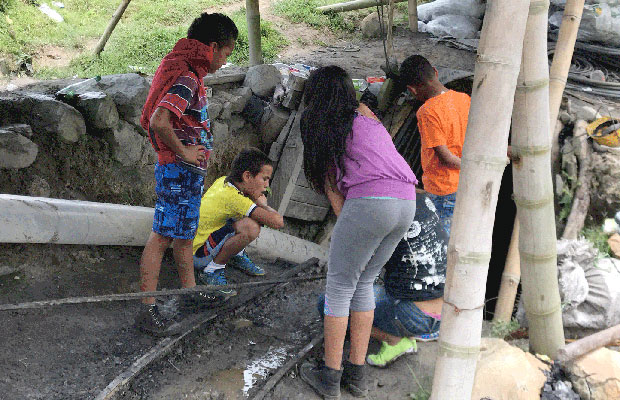
A Breath of Fresh Air Outside the Mines
Across Colombia, millions of people facing extreme poverty live in areas rich with mineral resources—where informal work in unlicensed mines easily hides labor exploitation as economic opportunity. In three different mining communities near Medellín, our Salesian missionaries are focused on a resource more precious than gold or coal—the children who live there, and how to protect and empower them.
These missionaries recognize that minors should not be miners—yet understand the temptation that families desperate for income face every single day. Many of them have labored in the mines for generations. Without the work, though back-breaking and hazardous, they would struggle and suffer just to survive. And, because mine operators value children for their small size and ability to wriggle in and out of tight spaces, some parents willingly send their sons and daughters into the tunnels. There, they can become trapped—not only in a suffocating underground world filled with toxic fumes, hazardous chemicals, and the constant threat of physical injury, but also in an inescapable cycle of illiteracy that destines them to work in the mines forever.
In fact, half of school-aged children in these communities no longer go to school. And the consequences to their futures can be devastating—especially for girls. Young girls who are forced to work miss out on important opportunities for education, which leads them to become dependent on others while lacking the ability to take care of themselves.
“Childhood is a precious treasure, and these girls and boys deserve to experience it above ground—far from the risks to their health and their lives,” says Father Gus Baek, director of Salesian Missions. “More than that, they deserve to go to school so they can start building more hopeful futures for themselves. In order for this to happen, we need to support broad-based and lasting change so that families can see another way forward.”
This starts with access to education.
Salesian missionaries at Don Bosco City in Medellín are no strangers to this concept. Since 1965, the program—the oldest and largest to serve at-risk youth in the country—has rescued and rehabilitated about 83,000 girls and boys, many of whom are former child soldiers. Here, Salesian missionaries offer a multi-pronged approach. The program is designed to address the broad social issues that contribute to the poverty and exploitation these youth face while training them in the skills necessary to break the cycle of violence and poverty. Currently, around 900 youth between the ages of 8 and 12 live and go to school at Don Bosco City.
A new initiative aims to leverage this vast experience and success on behalf of children working in the mines. To start, missionaries hope to enroll 150 families from Sinifaná, Amagá and Angelópolis in a program that will teach parents marketable skills while educating them about children’s rights and equipping them with the knowledge and assistance they need to protect their children from exploitation.
“It’s not enough to take precious boys and girls away from the dead-end mines, and give them care and education,” says one of our missionaries who is spearheading the program. “It’s also necessary to act on a far-reaching economic mechanism that calls for a change in the local culture.”
It is Salesian programs like this around the globe that are truly making a difference to end the cycle of poverty.
Our mission helps youth facing poverty and labor exploitation. What’s your mission?
Learn more about our work in Colombia.

